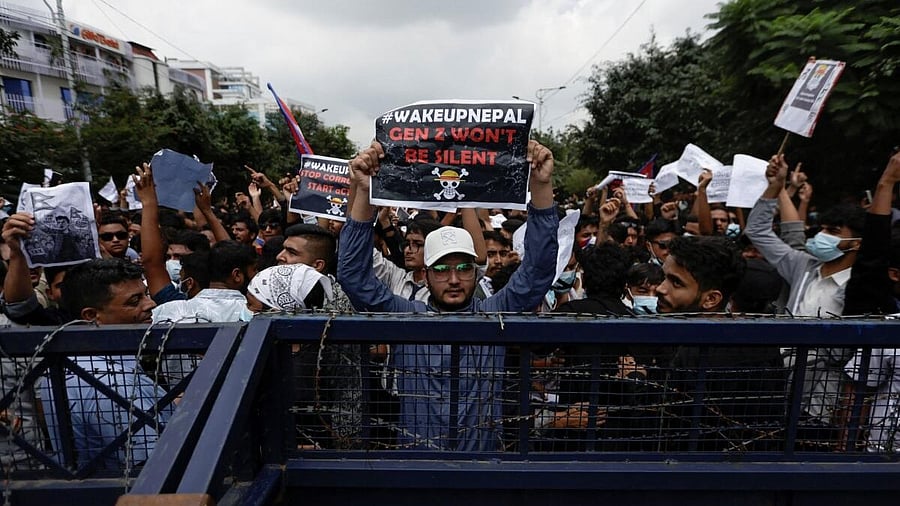
Demonstrators holding placards stand behind barricades during a protest against corruption and the government's decision to block several social media platforms, in Kathmandu, Nepal.
Credit: Reuters Photo
Violent protests rocked the streets of Nepal on Monday in the face of a social media ban imposed by the government.
The government of Nepal, on September 4 banned various social media apps, including Facebook, Instagram, and YouTube stating they failed to register their platforms with the Ministry of Communication and Information Technology before the announced deadline. The ban immediately came into effect.
The social media ban, however, was just a trigger for the protests brewing for a long time against alleged corruption within the politician's of the country. A social media trend has been making circles, focusing on the children of politicians in Nepal.
Named as the 'Nepo Kid' trend, it was garnering attention within Nepal, and globally, which accused the children of high-profile leaders and politicians of living opulent lives, allegedly funded by money earned through corruption.
With Gen Z participation, the 'nepo kid' trend gained views prior to the social media ban. The posts related to the trend contained the hashtags, #NepoKids, #NepoBabies, and went viral as Nepal's youth began to criticise the lavish lifestyle of politicians' children. The trend earned more spotlight after the ban was imposed and as per a report by the Kathmandu Post, 26 sites had to be removed in a futile attempt to quell the agitation.
"Nepo Kids show off their lifestyle on Instagram and TikTok, but never explain where the money comes from," a TikTok user commented.
The term 'Nepo' comes from the word 'Nepotism,' which has been excessively used in film industries that refers to children gaining opportunities because of their parents' influence. The trend began to mark the difference between the 'nepo kids' and the youth of Nepal, where the unemployment rate continues to pose a challenge.
"When you see politicians’ children, it feels like taxpayers’ money has funded their luxury cars, foreign education and lifestyle, while ordinary youths are forced to work hard abroad," a Reddit post read.
The trend has the internet divided. While users point out the 'corruption funded' lives of the children, some say that they cannot be blamed for their parents' mistakes.
"It is unfair for children to be punished for their parents’ mistakes. This can have a negative effect on their personal lives," a TikTok user posted, as quoted on Kathmandu Post.
The ban was temporarily lifted as the protests progressed, which killed 19 and left over 300 injured. The ban was initiated as the country's measure to "curb misinformation". With over 90 per cent of the population having access to the internet, the social media platforms shut down on September 5. The protests go beyond just the ban, it infringed citizen rights, as Nepal's journalists came forward to share. The decision of the ban was taken during a meeting led by Communications and Information Technology Minister Prithvi Subba Gurung.
As the demonstrations turned violent, the Home Minister of Nepal Ramesh Lekhak resigned on moral grounds. Prime Minister KP Sharma Oli also resigned on Tuesday after demonstrators attacked private residences of several top politicians, including President Ramchandra Paudel, and vandalised the parliament.
The 'Nepo Kids' trend focuses not only on the lavish lifestyles of politicians' children, but the stark contrast it holds to the reality of Nepali youth, who continue to demand for transparency and equality.
